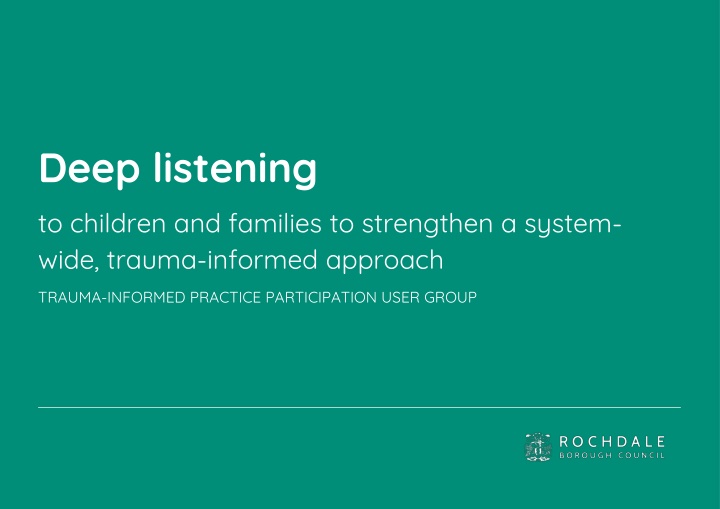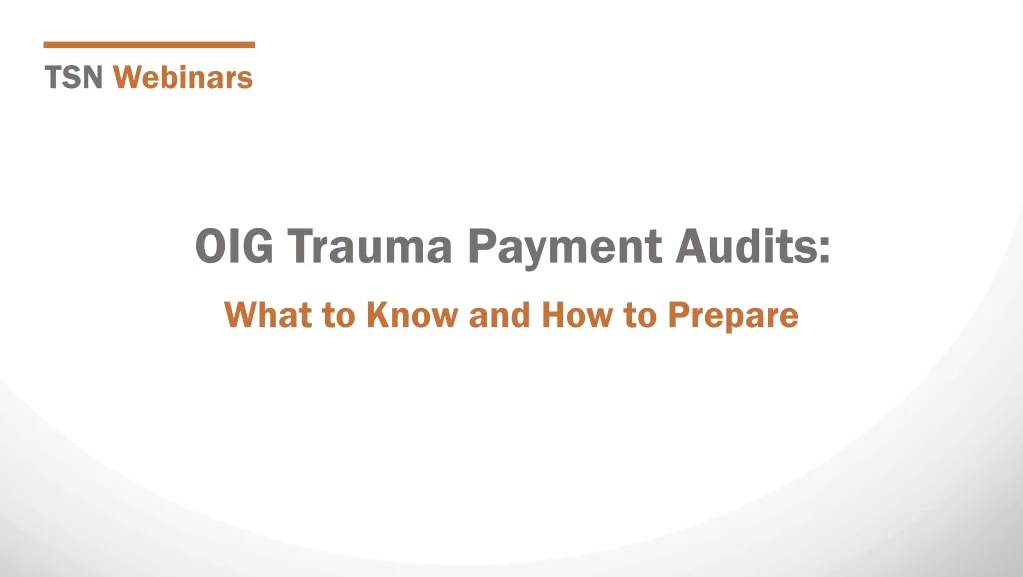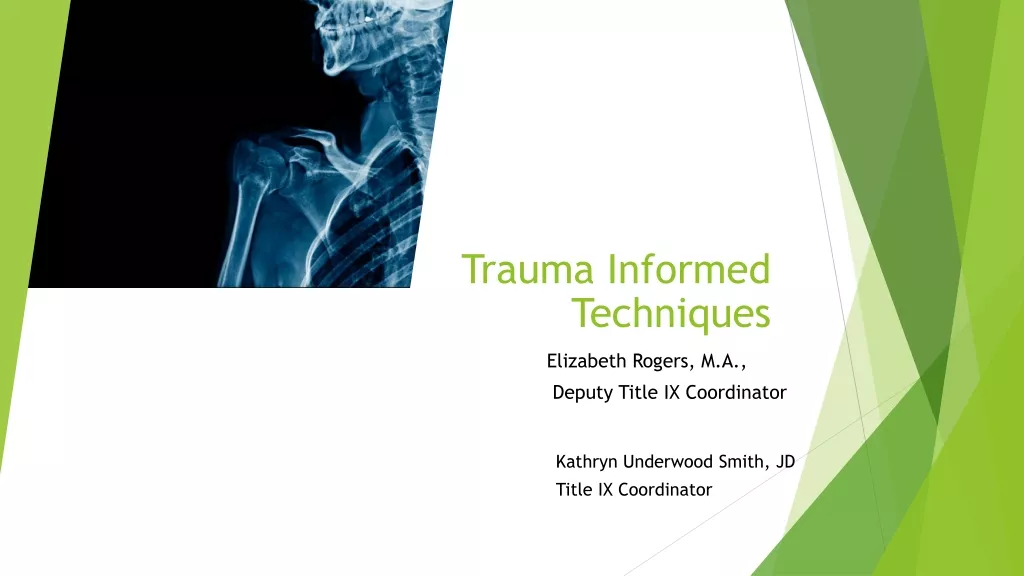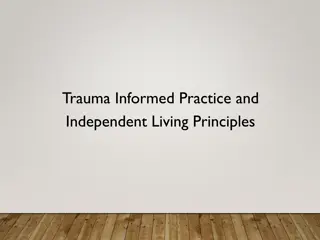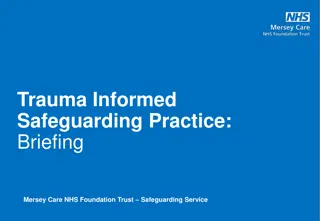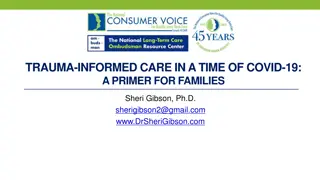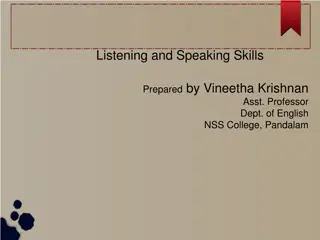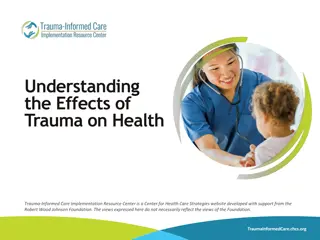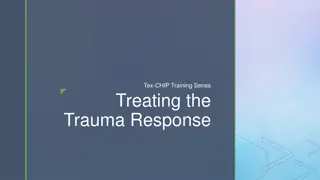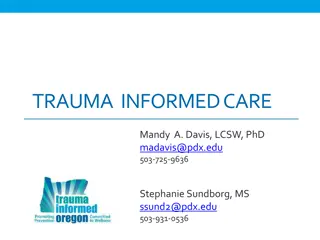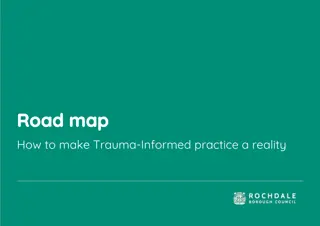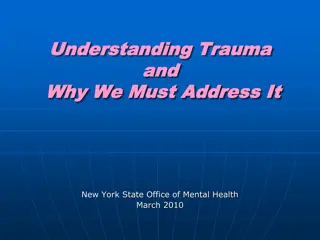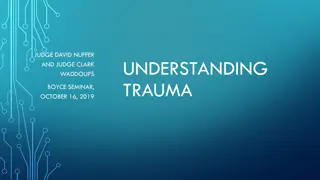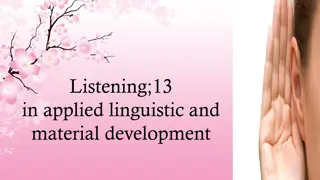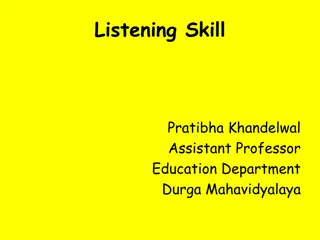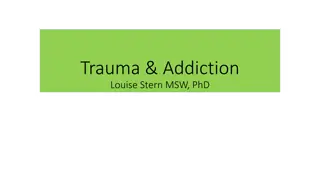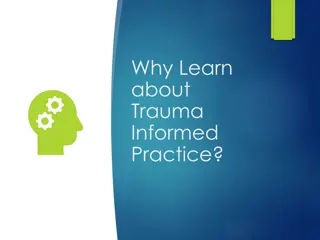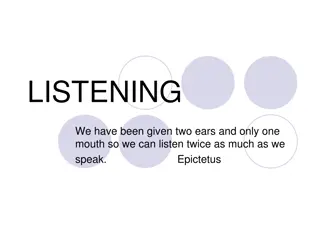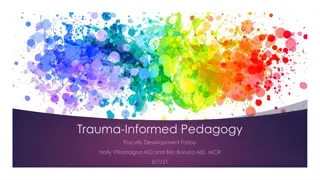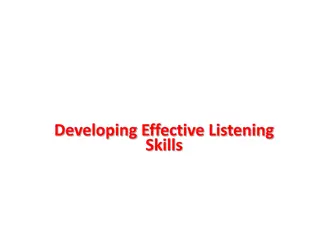Deep Listening for Trauma-Informed Practice Participation User Group
Implementing a trauma-informed approach involves deep listening to children and families to enhance the system-wide support. This includes engaging with individuals in Rochdale to gather insights on their experiences with trauma and support services. The process involves conducting interviews, reflecting on findings, and developing actions based on user input to improve trauma-informed practice.
Download Presentation

Please find below an Image/Link to download the presentation.
The content on the website is provided AS IS for your information and personal use only. It may not be sold, licensed, or shared on other websites without obtaining consent from the author.If you encounter any issues during the download, it is possible that the publisher has removed the file from their server.
You are allowed to download the files provided on this website for personal or commercial use, subject to the condition that they are used lawfully. All files are the property of their respective owners.
The content on the website is provided AS IS for your information and personal use only. It may not be sold, licensed, or shared on other websites without obtaining consent from the author.
E N D
Presentation Transcript
Deep listening to children and families to strengthen a system- wide, trauma-informed approach TRAUMA-INFORMED PRACTICE PARTICIPATION USER GROUP
Rochdale: A trauma-informed borough Interviews with children, young people and adults can provide insights into: This document sets out the proposed approach for capturing and recording the voices of people who have experienced trauma and who have received support. It is designed to be used by frontline practitioners who work directly with people. Service User perspectives on the support they ve been receiving What worked well and why What hasn t worked well and why How does this link to our understanding of trauma- informed practice This pack provides context on the purpose of deep listening interviews, a rough outline of the interview shape, guidance on how to conduct and write up the interviews and consent forms. Findings should be discussed with team leaders and colleagues in a facilitated way to inform new ways of working.
Engaging with people in Rochdale Key objectives To understand how children, young people and adults with experience of trauma are perceiving the support and services offered to them and what this tells us about trauma- informed working. 1. To draw out some reflections on how current services are working for people: what is people s experience of these services? How responsive are these services to the trauma our children, young people, adultes have experienced? 2. What does this tell us about how we re currently embedding trauma-informed practice? 3. Developing actions and improved ways of working based on children, young people and families input.
Overview of the process 1 2 3 4 Fill out the story gathering template Set a reflective session with your team to discuss findings Familiarise yourself with the materials and choose potential participants Conduct the interview with the participant after you have gained their informed consent Reflect together on how the interview process went, and learnings on trauma-informed practice Read the context, purpose of this work; and the interview guide, story gathering template and consent forms Make it clear that you are gathering information for an external project and that this is different from their Care Plan etc. Think about which people you work with you could engage with on this work Make sure that they know their rights before you start (see slide 12-13)
Engaging with services users Q&As Who can carry out the interview? Any key worker working in the selected service who has a good relationship with someone who might be interested in taking part. How long should the interview last? The interview should last about 20-30 minutes, but you are free to make it last as long as you wish. How do I prepare for the interview? On the next slide you will find some key characteristics for trauma-informed practice. It might be useful to familiarize yourself with these characteristics prior to the conversation. Do I have to stick to the interview guide? The interview guide is just here to help but you can lead the conversation in the direction you think is best. What s important is that you are able to fill out the sharing back template (Slide X) with what s been working and not working for them, what s helped them and what has hindered them.
Trauma-informed practice Key features Training in trauma People working with families are trained to identify and respond to trauma Screening for and recording trauma / ACEs Asking about trauma as part of admission/assessment and recording experience on case file Managing secondary trauma The service has strategies/ procedures to address secondary traumatic stress among our staff Building relationships Support through relationships with practitioners who understand their trauma / ACES and work with them to become more resilient Collaborating within and across teams Procedures to improve collaboration within the team and with external agencies Strengths-based support Empowered to make choices about the support they receive, and to build on their strengths. Leadership and ethos Leaders champion practice, the service uses trauma-informed language and processes Safe environments Services are provided in trauma- informed environments, where people feel safe and welcomed
Interview guide This interview guide provides a rough outline for your conversation. You do not need to ask every question. Use your instinct about what feels appropriate, and allow your conversation to follow a natural flow. Keep the characteristics for trauma-informed practice in mind and use these to guide you on follow-up questions and reflection. What can you tell me about the different people who support you at the moment? What are your relationships with them like? Are there some relationships that are easier, or more difficult than others? Why? What has been your experience of sharing your story or reporting your experience with different practitioners? Tell me a story of when you have had a really good experience of receiving support - what made this such a good experience? What word or words would you use to describe how you feel about the support you receive now? Tell me a story of when things could have been better - what was it that was missing? REFLECTION How does this link in with the characteristics of trauma-informed practice What help did you really appreciate? What do you wish you had been offered at that point? Screening & Recording What would you consider to be a safe space? What makes a place feel safe for you? Safe Environments Strengths-based support What are your hopes for the future? What would help you get there? Building Relationships
Sharing back After the interview is finished, record your findings on the following template
Story gathering template (1/2) On the participant Name (pseudonym) Age Gender Please refer to Rochdale Borough Council categories to complete this section Ethnicity Area of Rochdale the person lives in To your knowledge, is the participant someone who has a disability and/or EHC plan involved with youth justice involved with social care in full time education someone who has mental health issues someone who needs easyread or other accessible materials to participate?
Story gathering template (2/2) For the interviewer Who you are (your name and title) When did you carry out the interview? Briefly describe this person based on what you already know about them (e.g. where they live, do they attend school etc.) What is your engagement with the person to date?
Key findings and learnings What has worked particularly well for them? What hasn t worked so well for them? Tips Record some of the key information from the stories the person told you. Think about the different services and agencies you heard about, and the person s experiences with those services. This doesn t have to be about trauma explicitly.
Key findings and learnings What does this person s story tell us about: - - What helps them feel seen, listened to and safe? What makes them feel unsafe or unsupported? Reporting/telling a story Relationships with practitioners Strengths-based Support Environments
Consent forms Please read it carefully before the interview and go through it with the participant before you start Make sure you keep a record of consent received
Gathering informed consent What is this project about? How does it work? Rochdale Borough Council are working to develop trauma- informed ways of working. We want to hear about your experiences, and to gather your ideas on how this might be done in the best possible way. Your key worker will arrange a time to meet and talk. They will ask some questions about your your experience of receiving support from this service and your ideas on how things could be better. We understand that you will know better than anyone else about what needs to change, so we really want to hear from you. This should take about 20-30 minutes. Your key worker will share a summary of your conversation with their team. We are developing a collaborative, trauma-informed approach across different services with input from leaders, practitioners and communities to ensure people in Rochdale can access the support they need in the way that really works best for them. Information that your practitioner shares will be confidential. Your name will not be used in any of the work. We will replace your name with a different name so no one knows it is you. We will use your stories to help other people across Rochdale to get the support they need, when they need it. The summary of the conversation and quotes might be used in written materials such as presentations, blogs and publications.
Gathering informed consent What are my rights if I take part? You have the right not to be judged for what you share with us. We know that stuff can happen for many reasons, many of which are out of our control. We value your honest options and will not be judged on your views. It s totally up to you whether you take part. You can say yes or no without upsetting us or any one else and without any impact to yourself or people you know. You have the right for your data to be held safely. We make sure there s no way you can be identified by taking part, and that your privacy isn t compromised. This is a separate conversation and details will not be held on your case file. You have the right to privacy. We don t share anything that would identify you with anyone. When we write up our research, we might use quotes from you, but never with your name. You have the right to decide how much you share, and how fast things go. We know we re asking people to speak about stuff that can be sensitive and emotional. You can choose not to answer questions that feel like too much - or take breaks - or stop if that feels right for you. It s your call. You have a right to change your mind, or withdraw consent at any time. This can be before, during, or after the session. Just ask us to delete your data. It s no problem. You have the right to ask questions, or get in touch if you have a complaint, any time. Keeping you safe If we came across information that suggested you were at risk of abuse, we would have to discuss it with you straight away to ensure you have the right support. We would do the same if we came across other big risks to your safety.
Gathering informed consent Date By consenting verbally, I confirm that I understand: Name of interviewer / key worker: Taking part in this research is my choice: I don t have to if I don t want to. I ve had a chance to ask questions if I want to - and I can ask more at any time. What I share in the conversation will be used to help people who make decisions in Rochdale better understand the experiences of children, young people and adults. Any quotes from me won t include my name. I can confirm that [ ] has given verbal consent before I started the interview Anything I share is held securely. Anything that might identify me is deleted when the report is published. My data is deleted within 1 year. If anything makes me uncomfortable, I want to stop and take a break, or there s a question I don t want to answer, that s not a problem. Raising concerns won t cause trouble for my key worker, it won t change my relationships with services, and it won t mean I m judged in any way. My comfort is the most important thing. Interviewers, please ensure you are keeping a record of informed consent given. Do not use the person s name, instead use the pseudonym you will use in the write up to ensure anonymity I can withdraw consent at any time - even after the interview is over - which would mean nothing I ve shared will be used. It will all be deleted.
Parental consent forms Please read it carefully before the interview and go through it with the participant before you start Make sure you keep a record of consent received
Gathering informed consent What is this project about? How does it work? Rochdale Borough Council are working to develop trauma- informed ways of working. We want to hear about your experiences, and to gather your ideas on how this might be done in the best possible way. A key worker will arrange a time to meet and talk. They will ask some questions about the child s experience of receiving support from a service and their ideas on how things could be better. We understand that you will know better than anyone else about what needs to change, so we really want to hear from you. This should take about 15-30 minutes. How data will be used? All information that is shared with will be confidential. The child s name or any other names mentioned will not be used in any of the work. We will replace their name with a different name so they can t be identified. We are developing a collaborative, trauma-informed approach across different services with input from leaders, practitioners and communities to ensure people in Rochdale can access the support they need in the way that really works best for them. We will use their stories to help other people across Rochdale to get the support they need, when they need it. The summary of the conversation and quotes will be used in written materials such as presentations, blogs and publications.
Gathering informed consent What are my rights if I take part? They have the right not to be judged for what they share with us. We know that stuff can happen for many reasons, many of which are out of our control. We value their honesty and no one will be judged on their views. It s totally up to you. You can say yes or no without upsetting us or any one else and without any impact to yourself, your child or people you know. You are more than welcome to join the conversation together with your child. You and your child have the right for their data to be held safely. We make sure there s no way they can be identified by taking part, and that their privacy isn t compromised. This is a separate conversation and details will not be held on their case file. You and your child have the right to privacy. We don t share anything that would identify your child with anyone. When we write up our research, we might use quotes from them, but never with their name or any other names mentioned. You and your child have a right to change your/their mind, or withdraw consent at any time. This can be before, during, or after the session. Just ask us to delete any data. It s no problem. Your child has the right to decide how much they share, and how fast things go. We know we re asking people to speak about stuff that can potentially be sensitive and emotional. They can choose not to answer questions that feel like too much - or take breaks - or stop if that feels right for them. It s their call. You and your child have the right to ask questions, or get in touch if you have a complaint, any time.
Gathering informed consent By consenting, I confirm that I understand: My child taking part in this research is my and my child s choice. Parents Consent: What I share in the conversation will be used to help people who make decisions in Rochdale better understand the experiences of children, young people and adults. Any quotes from my child won t include their name or any other names mentioned in the conversation. I agree to my child taking part in this activity. Date Anything they share is held securely. Anything that might identify them or anyone else is deleted when the report is published. All data is deleted within 1 year. Name Parents are welcome to join the conversation, although they don t have to. If anything makes me or my child uncomfortable, they want to stop and take a break, or there s a question they don t want to answer, that s not a problem. Raising concerns won t cause trouble, it won t change relationships with services, and it won t mean anyone is judged in any way. Comfort is the most important thing. Signature I can withdraw consent at any time - even after the interview is over - which would mean nothing that was shared will be used. It will all be deleted.
